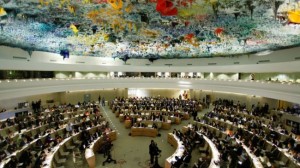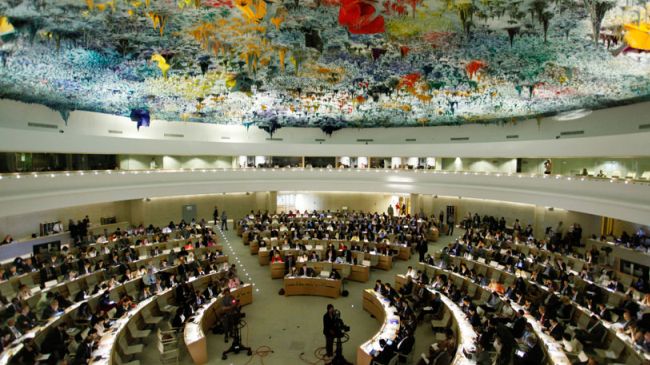 (Geneva) As the 25th session of the Human Rights Council (HRC) begins, many governments in the Arab region are increasingly criminalizing and violently repressing almost all forms of free expression and assembly. Peaceful protestors, independent media outlets, and civil society organizations are increasingly targeted through excessive force, extra-legal measures, and repressive new legislation, said the Cairo Institute for Human Rights Studies (CIHRS).
(Geneva) As the 25th session of the Human Rights Council (HRC) begins, many governments in the Arab region are increasingly criminalizing and violently repressing almost all forms of free expression and assembly. Peaceful protestors, independent media outlets, and civil society organizations are increasingly targeted through excessive force, extra-legal measures, and repressive new legislation, said the Cairo Institute for Human Rights Studies (CIHRS).
We call upon the Council to take a firm, principled position on the deteriorating human rights situations in Syria, Sudan, Libya, the occupied Palestinian territories, Yemen, Egypt, Bahrain, and Iraq. Member states of the Human Rights Council have a moral obligation to use this session to strongly oppose attempts by governments in the Arab region to eradicate the pro-democracy movements in their countries through wholesale repression. The situations in Syria and the occupied Palestinian territories, in particular, necessarily merit a form of international accountability due to the absence of any form of national remedy.
A resolution to renew the UN Commission of Inquiry on Syria, charged with investigating war crimes and crimes against humanity committed in the country, is scheduled to be voted on at this session of the HRC. While the resolution is expected to pass, many fear a substantial drop in the number of states that will vote in support the resolution. Any drop in support for the Syrian resolution will greatly undermine efforts to ensure accountability for crimes against humanity being committed in Syria and will, in effect, encourage the horrific brutality being inflicted on the Syrian people, including women and children.
A resolution on Libya that will renew technical assistance between the UN and the Libyan government on human rights issues is also expected to be proposed. Libyan civil society and CIHRS have called for a stronger mandate to be given to the UN Office of the High Commissioner for Human Rights to monitor and report on human rights violations and challenges in the country.
Moreover, a follow-up resolution on the Promotion and Protection of Human Rights during Peaceful Protests is expected to be proposed by Switzerland, Costa Rica, and Turkey. CIHRS believes that the resolution on peaceful protests should respond to the lack of sufficient international guidelines on how states should respect the rights of protesters. With protesters in many countries of the Arab region still facing death, torture, arbitrary imprisonment, and sexual harassment and rape on a regular basis, it is imperative that the UN create such guidelines and ensure their implementation by governments with all due haste.
A resolution to renew the mandate of the Special Rapporteur on Human Rights Defenders will also be up for consideration. This comes at a time when a campaign of retribution is being carried out against human rights defenders by several Arab governments in response to the role they played in promoting democracy in the region, making this mandate more important than ever to Arab rights defenders.
In addition to the aforementioned activities, this session will see the presentation of the periodic reports of the UN Special Rapporteurs on torture, the situation of human rights defenders, and counter-terrorism and human rights. The outcomes of the Universal Periodic Reviews of Saudi Arabia and Israel will also be presented, and the state of human rights in the occupied Palestinian territories will be reviewed.
Share this Post

